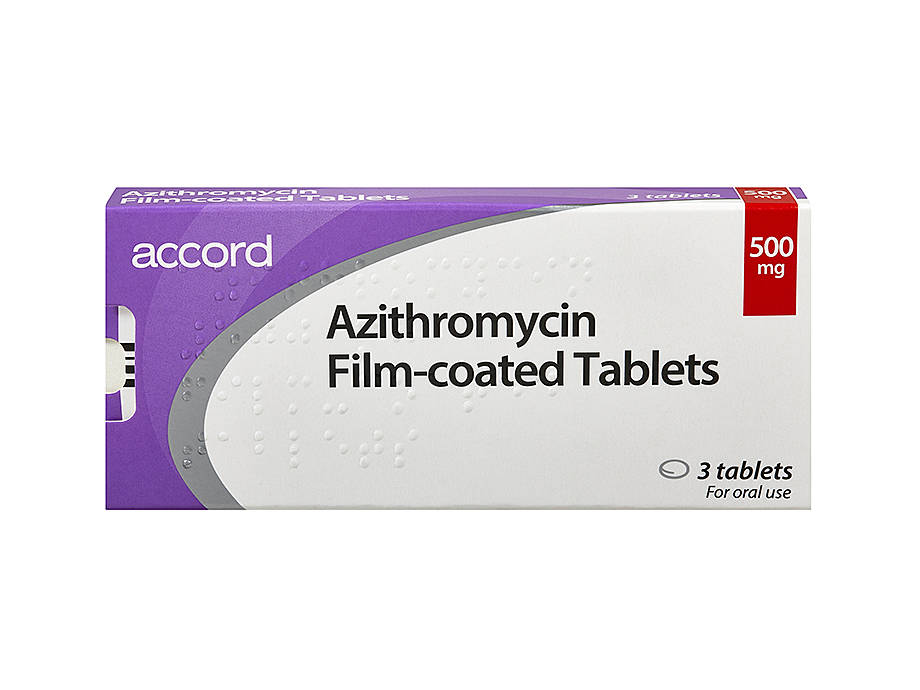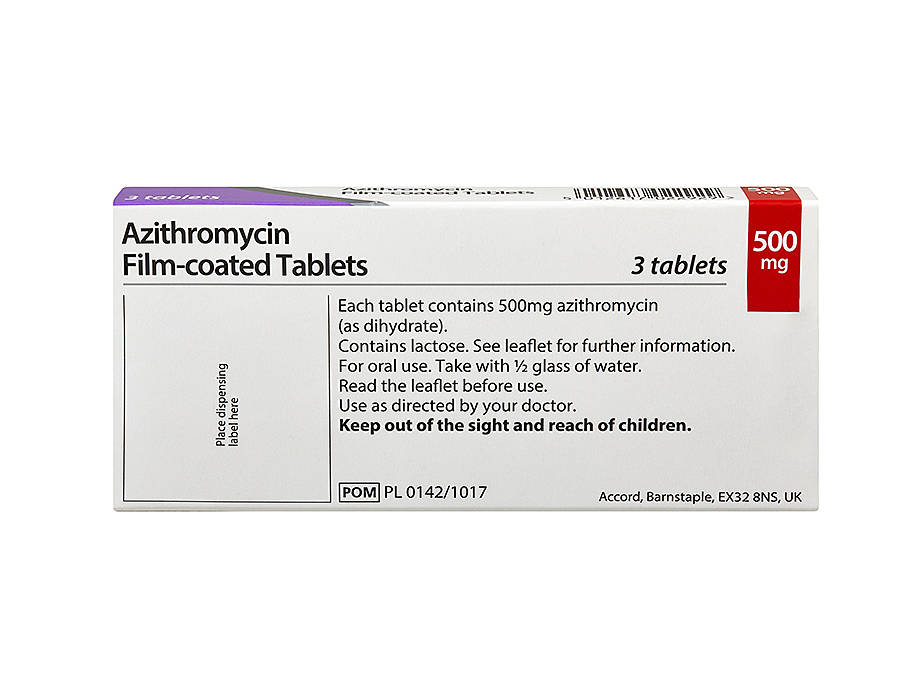Azithromycin
Use azithromycin to help treat traveller's diarrhoea.








Prices from £27.00
In stock. Simply fill in a brief questionnaire. One of our doctors will review your order and prescribe a suitable treatment. How to Order
-
Azithromycin 500mg tablets are a treatment used for traveller’s diarrhoea. They contain the active ingredient azithromycin, which is an antibiotic. The antibiotic can stop the growth of bacteria that causes traveller’s diarrhoea. One tablet is taken once a day for 3 days.




About Azithromycin
What is Azithromycin?
Azithromycin is an antibiotic medication. It is used to treat bacterial infections, such as traveller’s diarrhoea. This is usually caused by drinking contaminated water or eating contaminated food. Traveller’s diarrhoea is one of the most common illnesses in travellers. Azithromycin can also be used to treat ear, chest, skin, and soft tissue infections. This service is only for traveller’s diarrhoea, if you have any other conditions, please speak to your doctor for more advice.
Azithromycin can also be found under the branded name of Zithromax.
How does Azithromycin work?
Azithromycin is a type of antibiotic, which can stop the bacteria that usually cause traveller’s diarrhoea. Occasionally, traveller’s diarrhoea can be caused by a virus or parasite, but this is rare.
If your traveller’s diarrhoea is not caused by bacteria, azithromycin will not work. Speak to your doctor if you do not feel better after a few days of treatment, or get worse.
Will 500mg of azithromycin cure chlamydia?
Azithromycin can be used to treat chlamydia, but the dose that we prescribe for traveller’s diarrhoea is not the same. If you think you have chlamydia, you must speak to your doctor or visit a sexual health clinic to get tested.
-
-
You can buy azithromycin online for travellers’ diarrhoea from regulated services that can prescribe it to you, such as Asda Online Doctor. To get azithromycin online through our service, simply complete a short questionnaire about your current health and where you’re travelling to. If azithromycin is suitable, our doctors will issue a prescription and your treatment will be sent to your home, or to a chosen Asda Pharmacy for collection at a time that is convenient for you.
-
-
Azithromycin can be taken with or without food. The tablets should be taken at the same time every day, with half a glass of water. The usual dose is one 500mg tablet, once a day, for 3 days. You may feel better within a few days of treatment but you should always finish your course of antibiotics. If you do not, your traveller’s diarrhoea might come back. If you feel worse, or do not get better when your course is finished, speak to your doctor.
If you forget your dose, take it as soon as you remember. If your next dose is almost due, do not take your missed dose. Continue treatment and take your missed dose at the end of the treatment course. This will mean your treatment will last a day longer. Never take a double dose. If you take more than you should, speak to your doctor or visit A&E straight away.
-
-
Traveller’s diarrhoea will usually clear up on it’s own within 3 to 7 days without any treatment. Azithromycin can help to clear up the symptoms more quickly if they are severe.
If you have traveller’s diarrhoea, you can treat it at home by:
- getting plenty of rest
- drinking lots of fluids to replace those lost from diarrhoea
- using over the counter rehydration treatment, such as Dioralyte
- avoiding alcohol, caffeine, and products containing dairy, as this may make your diarrhoea worse
- introducing bland foods to your diet when your diarrhoea is getting better, such as dry toast or bananas
-
-
Before using azithromycin, speak to your doctor if you have:
- severe liver or kidney problems
- myasthenia gravis, which is a muscle weakness illness
- heart problems
- symptoms of another infection
- low magnesium or potassium levels in your blood
- intolerance to some sugars, as Azithromycin 500 contains lactose
You must stop using the tablets and speak to your doctor straight away if you suddenly feel faint or dizzy, feel your heart beating in your chest, have an abnormal heartbeat, or get muscle weakness. If you are pregnant or breastfeeding, speak to your doctor before using azithromycin.
Very common side effects include:
- nausea (feeling sick)
- wind
- diarrhoea
- stomach pains
Common side effects include:
- dizziness
- lack of appetite
- tiredness
- pins and needles
- headaches
- vomiting (being sick)
- skin rashes or itching
- joint pain
- changes to your vision
Uncommon side effects include:
- feeling nervous
- thrush
- drowsiness
- reduced sense of touch (hypoaesthesia)
- difficulty sleeping
- heart palpitations
- weakness
- swelling
- chest pain
- constipation
- ringing in your ears
- gastritis, which is inflammation of the stomach lining
- a skin rash (hives)
Rare side effects include:
- a spinning sensation (vertigo)
- feeling agitated
- a change in your liver function
There are some side effects which you may get whilst using azithromycin, but it is not known how often these happen.
These include:
- fainting
- fits (seizures)
- colour changes on your tongue
- change in your sense of smell or taste
- feeling hyperactive
- anxiety or aggression
- low blood pressure
You cannot take these tablets if you are allergic to azithromycin or any other macrolide antibiotics, such as clarithromycin or erythromycin. You also cannot take ergotamine (a medicine for migraines) whilst taking azithromycin, as this could cause serious side effects.
Azithromycin is also not suitable for patients of any age who weigh less than 45kg. If you weigh less than this, you will need to take a lower dose and should inform your doctor. If you have problems with your kidney or liver, your doctor may need to prescribe you a different dose.
If you get any mild side effects that do not go away after a few days of taking Azithromycin, speak to your doctor. If you have a severe allergic reaction, such as a skin rash and breathlessness, go to A&E straight away, or call 999. For more information on side effects, read the patient information leaflet.
There are some medications that may interact with azithromycin or stop it from working. Speak to your doctor before using this medicine if you also take:
- warfarin, or other medicines to thin your blood
- antacids, used to treat heartburn
- terfenadine, used for allergies
- ergotamine, used to treat migraines
- HIV treatment
- rifabutin, used to treat tuberculosis (TB)
- ciclosporin, medicine used after an organ transplant
- quinidine, used to treat heart rhythm problems
- colchicine, used to treat gout
- digoxin, used to treat heart problems

Dr Kathryn Basford is a qualified GP who works as a GP in London, as well as with ZAVA. She graduated from the University of Manchester and completed her GP training through Whipps Cross Hospital in London.
Meet our doctorsArticle created: 27 Sept 2021
Last reviewed: 27 Sept 2021
-
Antibiotic Therapy for Acute Watery Diarrhea and Dysentery (2017) National Center for Biotechnology Information (NCBI) (accessed 16 September 2021)
-
Azithromycin (2018) NHS (accessed 16 September 2021)
-
Azithromycin 500mg Film-coated Tablets (2021) EMC (accessed 16 September 2021)
-
Chlamydia Treatment (2021) NHS (accessed 16 September 2021)
-
Travelers' Diarrhea (2020) CDC (accessed 16 September 2021)


GMC: 7074021

GMC: 6149061

GMC: 7085115


When travelling to other countries, it’s possible that you will come into contact with bacteria that cause stomach infections. In order to treat common symptoms of this, including diarrhoea, Asda Online Doctor by ZAVA offers antibiotic tablets.





